Recent Recordings by Area Artists
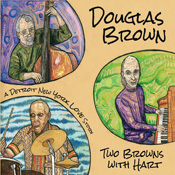
Pianist Douglas Brown is known locally as an eclectic musician who has worked in blues, R&B, and rock contexts, backing The Four Tops, Martha Reeves, Koko Taylor, Mighty Joe Young, and other artists, but has also played with more progressive players such as Faruk Z Bey. His brother Cameron is widely acknowledged as one of the finest bass players in jazz; a versatile musician who has worked in a wide range of contexts, from the more experimental stylings of George Russell, Don Cherry, and Archie Shepp to the more traditional modern jazz of Art Blakey and Sheila Jordan. From 1979 to 1992 he toured with one of the finest combos of the time, the George Adams/Don Pullen Quartet, and his long-lasting duo with Jordan is well known to local audiences. Recently, the two brothers got together, in tandem with the stellar drummer Billy Hart, to make a trio recording in a straight-ahead swinging manner: Douglas Brown, Two Browns with Hart.
The album, subtitled “A Detroit New York Love Story,” features Douglas’s compositions with the addition of two well-worn standards, “Route 66” and “Summertime,” that also feature his vocals. From the opening “Blues for Mom,” a midtempo laidback piece that features solos by everyone, it is clear that the three experienced pros engaged together as if they were a regularly working band. The pianist’s compositions provide a fine variety of tempos and moods, and the CD is well programmed as a whole and not just as a random collection of tunes. Even though Douglas often performs in raucous blues and R&B groups, here his blues performances, from the opening one to “Route 66,” are melodically and harmonically crafted in the modern jazz manner. “Big Bang for the Outer Galaxies,” however, unexpectedly pays tribute to the more avant perspectives of Cameron’s Pullen/Adams Quartet days, before settling into more sedate improvisations.
All in all, this is a lovely piano trio recording that will undoubtedly receive much radio play and should be checked out by anyone who likes swinging, melodically rich modern jazz.
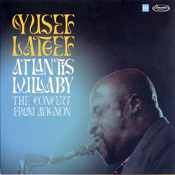
Producer Zev Feldman has been putting out a series of archival treasures, most of them concert or club recordings never before released in any form, and for this year’s “record store day” (April 20) he is giving us a feast of ten new albums, including the wonderful Atlantis Lullaby: The Concert From Avignon from July 19, 1972; a quartet date led by Detroit’s own Yusef Lateef on tenor sax and flute (the cover also lists soprano sax but it nowhere to be found) with pianist Kenny Barron, bassist Bob Cunningham, and drummer Albert “Tootie” Heath, who also plays Indian flute on two tunes.
The content is generous, spanning two CDs or LPs, with premier sound restoration, and except for one short track, the performances are lengthy: up to twenty-five minutes long. With the exception of the standard “I’m Getting Sentimental Over You” and “Eboness” by fellow Detroiter Roy Brooks, the compositions are by members of the band, three by Barron, and one each by Heath and Lateef. This was a working group, to my ears the best he ever had after leaving Detroit, and the leader enthusiastically featured his fellow musicians. The second track, “A Flower,” is a duet between Barron and Lateef that reminds us once again just how magnificent Lateef’s flute playing was, with a tone all his own, reflecting his lifelong study of the instrument with some of the best teachers of his time, and “Lowland Lullaby” is played by the bass and Indian flute only. The boogaloo “Eboness” has Lateef soulful singing into and next to his flute, but the main feature is Cunningham’s extended arco bass solo, something we would not hear again once he switched to playing the electric version of the instrument. “I’m Getting Sentimental” is Lateef’s ballad feature, although the tempo varies throughout. It is impossible to describe the rich virtuosity of his highly emotional saxophone playing with its melodic and harmonic ingenuity here and throughout the recital. This leads to a subdued and pensive, no less inventive, improvisation by Barron that segues into a splendid duet with Cunningham, imaginatively finished off by Lateef.
The concert ended with an extended Barron composition, “The Untitled,” with multiple strains that are worked out over more than twenty-five minutes, the longest piece from the concert. It begins with a boppish up-tempo romp with Lateef’s tenor revealing how he had absorbed some of Coltrane’s harmonic saxophone language, then resolves down to a lengthy dirge-like out-of-tempo duo with bass, pizzicato and then arco, at times incorporating Middle Eastern scales, joined quietly by Heath’s wooden flute in the background. Lateef bows out and the composer joins, over a continued note from the bass, but the mood is less somber, evolving as Lateef and Hart join in, with the leader occasionally flowing a few notes on wind instruments from his Middle Eastern collection while Hart slowly ups the tempo, as the band patiently intensifies the musical flow, which then decreases suddenly, leaving Barron alone for a masterful stylistically varied solo. As Barron takes the music out into more avant territory, the band comes in, with Lateef on a wooden reed instrument (shehnai?), laughter, silence, and then via a fleet Barron solo, a return to the opening theme.
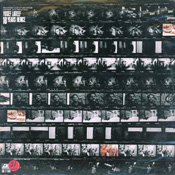
In the early seventies, Lateef was under contract with Atlantic and was putting out large group studio recordings, some of which were more successful than others. On the road, he was working mainly with the quartet presented here, but until now the only official documentation of that band was the double LP 10 Years Hence, recorded in 1974 at a San Francisco club, with orchestra overdubs over three quarters of the music and a couple of studio tracks on another album. There is, however, a short film made in Paris a couple of months earlier in the Parc Floral in Paris that contains four tunes, two of them overlapping with the new CD, documenting how the group played their repertoire differently every time (“The Untitled,” “Yusefs’s Mood”).
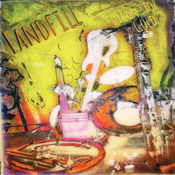
Many have tried to forget the tragic times of the worst of the COVID epidemic, but there were those who made the best of it, creating new ways of coping with the disruption of normal life patterns and the difficulties of keeping personal connections going. Among these were a group of some of the finest of our local musicians, who maintained their friendships by getting together on a regular basis to jam, often outdoors when that was possible. Once the plague had subsided to a tolerable degree and they returned to their regular activities, they made a record of what they had achieved, resulting in Diggin’ for Gold by Landfill, consisting of Dan Bilich, cornet, sousaphone, alto horn, bass, Paul Harrison, guitar, Ken Kozora, drums, percussion, Steve Oz Osburn, percussion, guitar, bass, and Paul Vornhagen, tenor and soprano saxes, clarinet, flute, and ocarina. The material in the CD is completely improvised, but because of their regular get-togethers, they obviously developed a wonderful sense of musical comradery, so that all five musicians work together with a seamless connection, as if much of the music had been planned out or written ahead of time. Everything rides on groovy rhythms, and in the beginning Bilich’s sousaphone sets down some New Orleans street music vibes that provide a lovely dance propulsion. The textures vary, as most members of Landfill play multiple instruments. Vornhagen plays sparingly, featuring the wonderful tone he has on all his horns and unlike some doublers plays them all differently. Initially he leads on soprano before moving on to tenor and flute, leading the group into melodic modal territory, where he is joined by Bilich on cornet. Harrison’s guitar comes in sparingly, but it is always right on point, in a sense connecting the rhythm section with the soloists commenting and prodding, while Kozora and Osburn provide driving subtle grooves that lie at the center of the band’s singular identity. While the music is rhythmically propulsive, there is a tinge of minor key melancholy that pervades some tracks, very much appropriate in view of the times when Landfill came into being. The band sounds like no other, which is high praise in itself.
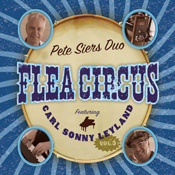
The Pete Siers Duo, Flea Circus, Vol. 3, Featuring: Carl Sonny Leyland is the third release of a wonderful series of encounters between the drummer and traditional jazz pianists. The initial one, with Mr. B at his finest, set a standard that is hard to match, but this one is so different that it successfully avoids comparison and marks its own territory. Carl Sonny Leyland, originally from England, living for years in California, began his career playing boogie-woogie piano in a manner learned from recordings, but quickly expanded his interests to play with blues and early-style rock bands. Throughout his long career he has acquired a vast repertoire of tunes, some borrowed, some new either his own compositions or adaptations of material from various eras and styles.
Of the fourteen tracks on this album, four were created by the duo, another four by blues pioneers such as Leroy Carr and Scrapper Blackwell, or Champion Jack Dupree. Some tunes such as “Cow Cow Blues” reprise boogie classics. On “Louisiana Fairy Tale,” first recorded by Fats Waller in 1935 but covered by many, Leyland tips his hat to the years he spent living in New Orleans, with a version that recalls more Leon Redbone’s version than the premiere account. The blues constitutes the bedrock of the recital, but also permeates everything the duo touches, including standards such as “S’posin,” “The World is Waiting for the Sunrise,” or “Roses of Picardy.” The latter, one of the great British hit songs of World War I, started life as a ballad, but the duo, perhaps inspired by a romping 1929 version by Red Nichols, creates an exuberant boogie version opened up by boisterous drumming. The pair create their very own “Yancy Pants,” a blues rooted in “[Jimmy] Yancy’s signature Crescent City walking bassline,” to cite the short but characteristically insightful liner notes by Arwulf Arwulf. Leyland is fabulous here, and throughout, Pete Siers demonstrates once again that he deserves an honorary doctorate for his study and mastery of the whole jazz drumming tradition, from Baby Dodds and Zutty Singleton, through George Wettling, and on to the present day. Much of contemporary jazz is permeated by various forms of traditionalism: some is of the dull soulless imitative kind, but then there are masters like Siers and Leyland (and, of course, Mr. B), who keep the past alive by making it new again with new creative perspectives.